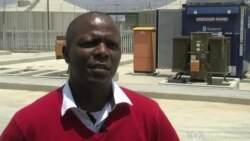JOHANNESBURG —
Like many countries, South Africa is struggling to meet its energy needs. But instead of developing new technologies, the nation is trying a different tack - using waste to generate power.
This is the unlikely source of South Africa’s future energy : a massive sewage pipe which runs through northern Johannesburg.
At a wastewater treatment plant, sewage is turned into energy, in the form of biogas. Plant engineers say electricity price hikes in South Africa pushed them to look into generating their own power.
This facility produces methane gas that powers about 15 percent of the plant’s electricity needs. Engineers hope to add more facilities to get to 50 percent.
Biogas is fuel created by the fermentation of organic material, like animal and human waste. It’s an age-old technology that has come back into fashion.
Engineer Peter Louw says South Africa has about 300 biogas-producing facilities, from home setups to large factories. Those facilities largely use the energy for their own needs.
“Biogas is, it’s energy, life energy, and we thought, let’s use it," he said. "Let’s enhance it, clean it and put it back into use so that we can then obviously improve lives, the quality of life.”
South Africa's Department of Energy is looking into ways to use biogas to power areas without reliable electricity, like Johannesburg’s impoverished township of Diepsloot. The department estimates some 3 million South African households have no power.
Mark Tiepelt, chairman of the South African Biogas Industry Association, has set up a biogas facility at his home.
“What we’ve got here is an in-situ[ation] cast concrete digester,” he said.
Tiepelt's home apparatus cost about $5,000. He powers it with horse manure from a nearby farm. Unlike the wastewater plant, he does not use his biogas to generate much electricity.
His apparatus generates enough biogas to power a stove, a water heater and a small generator.
Tiepelt's organization hopes other homeowners will pick up on the trend.
“We’ve probably got a total of maybe 300 digesters in the whole of South Africa. Now we compare it to a country like India, that’s got 12 million digesters, it just indicates the potential that we have in South Africa,” he said.
It’s a hot idea that could be ready to boil over.
This is the unlikely source of South Africa’s future energy : a massive sewage pipe which runs through northern Johannesburg.
At a wastewater treatment plant, sewage is turned into energy, in the form of biogas. Plant engineers say electricity price hikes in South Africa pushed them to look into generating their own power.
This facility produces methane gas that powers about 15 percent of the plant’s electricity needs. Engineers hope to add more facilities to get to 50 percent.
Biogas is fuel created by the fermentation of organic material, like animal and human waste. It’s an age-old technology that has come back into fashion.
Engineer Peter Louw says South Africa has about 300 biogas-producing facilities, from home setups to large factories. Those facilities largely use the energy for their own needs.
“Biogas is, it’s energy, life energy, and we thought, let’s use it," he said. "Let’s enhance it, clean it and put it back into use so that we can then obviously improve lives, the quality of life.”
South Africa's Department of Energy is looking into ways to use biogas to power areas without reliable electricity, like Johannesburg’s impoverished township of Diepsloot. The department estimates some 3 million South African households have no power.
Mark Tiepelt, chairman of the South African Biogas Industry Association, has set up a biogas facility at his home.
“What we’ve got here is an in-situ[ation] cast concrete digester,” he said.
Tiepelt's home apparatus cost about $5,000. He powers it with horse manure from a nearby farm. Unlike the wastewater plant, he does not use his biogas to generate much electricity.
His apparatus generates enough biogas to power a stove, a water heater and a small generator.
Tiepelt's organization hopes other homeowners will pick up on the trend.
“We’ve probably got a total of maybe 300 digesters in the whole of South Africa. Now we compare it to a country like India, that’s got 12 million digesters, it just indicates the potential that we have in South Africa,” he said.
It’s a hot idea that could be ready to boil over.





